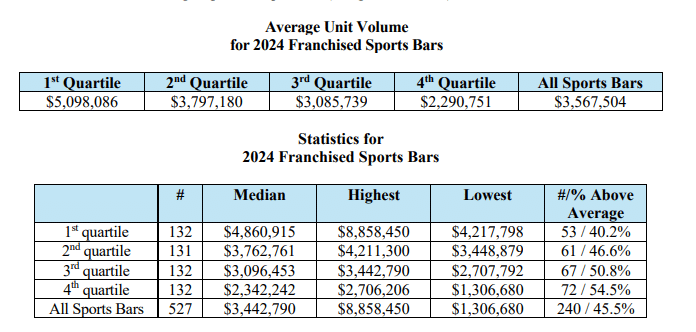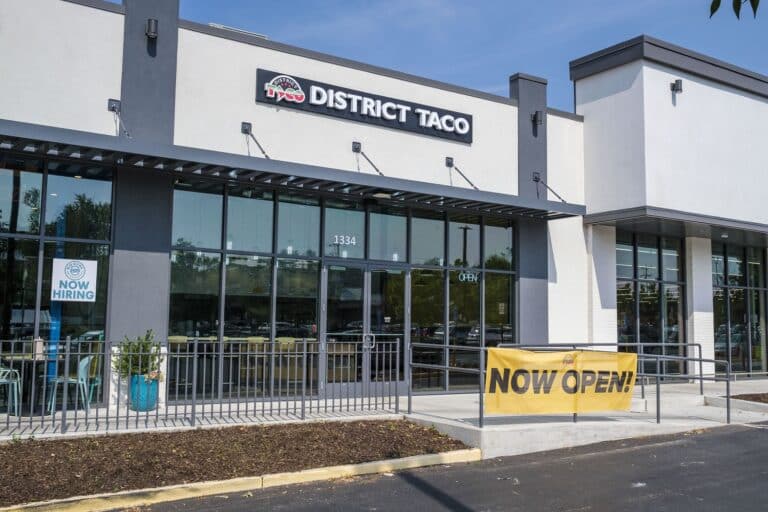Buffalo Wild Wings Franchise FDD, Profits & Costs (2025)

Buffalo Wild Wings, a leading name in the casual dining and sports bar franchise market, was founded in 1981 by James Disbrow and Scott Lowery. They were inspired to open a restaurant after moving from Buffalo, New York, to Ohio, where they couldn’t find authentic Buffalo-style wings.
The first location opened in 1982 in Columbus, Ohio, marking the start of a major player in the food industry. The company is headquartered in Minneapolis, Minnesota. Buffalo Wild Wings began franchising in 1991, offering franchisees the chance to join a growing brand known for its sports-themed atmosphere.
The franchise sets itself apart with a menu featuring 26 signature sauces and seasonings, along with wings, burgers, salads, and more. Its lively environment, perfect for watching sports, has made it a popular choice in the Quick Service Restaurant (QSR) sector, especially among sports fans.
Initial Investment
How much does it cost to start a Buffalo Wild Wings franchise? It costs on average between $2,450,000 – $4,883,000 to start a Buffalo Wild Wings franchised restaurant.
This includes costs for construction, equipment, inventory, and initial operating expenses. The exact amount depends on various factors, including the type of restaurant you choose, the location, and whether the franchisee chooses to lease or purchase the property.
| Type of Expenditure | Amount (All Location Types) |
|---|---|
| Fees related to site approval | $1,200 to $53,800 |
| Initial franchise fee | $12,500 to $25,000 |
| Reimbursement for on-site training | $0 to $105,000 |
| Total Site Approval, Franchise & Training Expenses | $13,700 to $183,800 |
| Architecture fees | $90,000 to $160,000 |
| Construction and leasehold improvements | $1,200,000 to $2,100,000 |
| Furniture, fixtures, equipment, and fixed assets | $570,000 to $925,000 |
| Audio/Visual equipment | $275,000 to $425,000 |
| Computer POS system / kitchen display unit | $28,245 to $50,520 |
| Office equipment and supplies | $6,000 to $13,000 |
| Sports memorabilia | $12,500 to $26,500 |
| Signage and graphics (excluding pylon/monument) | $43,000 to $100,000 |
| Total Building / Construction / Equipment | $2,224,745 to $3,800,020 |
| Training expenses | $15,000 to $40,000 |
| Initial inventory | $15,000 to $19,000 |
| Insurance | $14,400 to $48,000 |
| Additional funds – 3 months | $100,000 to $150,000 |
| Rent | $7,500 to $40,000 |
| Lease and utility security deposits | $10,000 to $20,000 |
| Grand opening advertising | $12,500 |
| Liquor license | $5,000 to $500,000 |
| Professional fees | $20,000 to $70,000 |
| Total Pre-Opening / Operating Deposits | $199,400 to $899,500 |
| Total Estimated Initial Investment | $2,450,345 to $4,883,320 |
Average Revenue (AUV)
How much revenue can you make with a Buffalo Wild Wings franchise? A Buffalo Wild Wings franchised restaurant makes on average $3,443,000 in revenue (AUV) per year.
Here is the extract from the Franchise Disclosure Document:

Buffalo Wild Wings Franchise Disclosure Document
Frequently Asked Questions
How many Buffalo Wild Wings locations are there?
As of the latest data, Buffalo Wild Wings operates 538 locations across the United States and internationally. The majority of these locations are franchised, while a portion are company-owned. The brand continues to expand its presence in both domestic and global markets.
What is the total investment required to open a Buffalo Wild Wings franchise?
The total investment required to open a Buffalo Wild Wings franchise ranges from $2,450,000 to $4,883,000.
What are the ongoing fees for a Buffalo Wild Wings franchise?
Buffalo Wild Wings franchisees are required to pay a royalty fee of 5% of gross sales. In addition, there is a marketing fee of 3.25% of gross sales, which supports both national and local advertising efforts. These ongoing fees help maintain brand consistency and drive customer traffic across all Buffalo Wild Wings locations.
What are the financial requirements to become a Buffalo Wild Wings franchisee?
To become a Buffalo Wild Wings franchisee, candidates must have a minimum net worth of $1 million, with at least $750,000 in liquid capital. These financial criteria are in place to ensure that franchisees have the necessary resources to cover startup costs and maintain operations during the initial stages of the business.
Who owns Buffalo Wild Wings?
Buffalo Wild Wings is owned by Inspire Brands, a multi-brand restaurant company. Inspire Brands acquired Buffalo Wild Wings in 2018 as part of a $2.9 billion deal. Inspire Brands also owns other well-known restaurant chains such as Arby’s, Sonic Drive-In, and Dunkin’.
Disclaimer
Disclaimer: This content has been made for informational and educational purposes only. SharpSheets is an independent educational resource and is not affiliated with, endorsed by, or representing any franchisor mentioned on this website. Where noted, figures are taken from the franchisor’s Franchise Disclosure Document (FDD). In some cases, we may provide independent calculations or estimates based on publicly available information. We do not make any representation or warranties with respect to the accuracy, applicability, fitness, or completeness of the information presented in the article. You should not construe any such information or other material as legal, tax, investment, financial, or other professional advice. Nothing contained in this article constitutes a solicitation, recommendation, endorsement, advertisement, or offer to buy or sell any franchises, securities, or other financial instruments in this or in any other jurisdiction in which such solicitation or offer would be unlawful under the franchise and/or securities laws of such jurisdiction.
All content in this article is information of a general nature and does not address the detailed circumstances of any particular individual or entity. Nothing in the article constitutes professional and/or financial and/or legal advice, nor does any information in the article constitute a comprehensive or complete statement of the matters discussed or the law relating thereto. You alone assume the sole responsibility of evaluating the merits and risks associated with the use of any information or other content in this article before making any decisions based on such information or other content.




